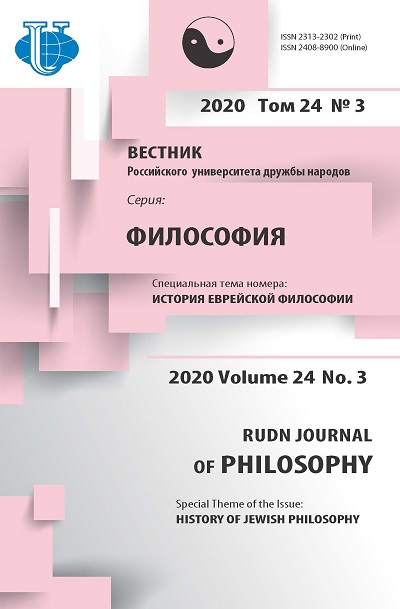Hermeneutics of Aristotle and Hermeneutics of Sophists in Terms of Dialogue Philosophy. Part 1
- Authors: Dvorkin I.1
-
Affiliations:
- Hebrew University of Jerusalem
- Issue: Vol 24, No 3 (2020): HISTORY OF JEWISH PHILOSOPHY
- Pages: 480-501
- Section: PHILOSOPHY OF DIALOGUE
- URL: https://journals.rudn.ru/philosophy/article/view/24360
- DOI: https://doi.org/10.22363/2313-2302-2020-24-3-480-501
Cite item
Full Text
Abstract
The article considers the logical and philosophical doctrine of sophists, which, according to some modern researchers, was more philosophical than their ancient critics recognized. A comparison of the provisions of Aristotle's hermeneutics with preserved fragments of Protagoras and Gorgias shows that the doctrine of sophists was a kind of holistic philosophy, which anticipated the philosophy of dialogue of the XX century. Despite the fact that the philosophy of Plato and Aristotle tried to overcome the relativism and anti-ontologism of the doctrine of sophists, some elements of its dialogueism were preserved in subsequent philosophy in dialectics and rhetoric. The first thing you should pay attention to is the difference between the dialogical form of the presentation of philosophy in Plato and dialogue as the fundamental basis of thinking that we find among sophists. The dialogueism preserved in the dialectic of Plato and the rhetoric of Aristotle is more a technical method of convincing the interlocutor than a hermeneutical basis, which it is in the philosophy of dialogue and in the method of Socratic discussion. The linguistic turn that occurred in the philosophy of the 20th century includes not only an increased interest in language and accuracy of expression. No less important is the new formulation of the question of the nature of the language. Is language a tool for the formulation of thought as Aristotle believed and followed by representatives of modern analytical philosophy, or does it have its own fundamental status, as representatives of the philosophy of dialogue believe? In this context, it is very important for the philosophy of dialogue to find in the thinking of the pre-Socratics those predecessors who already two and a half thousand years ago charted the paths for modern thought. The first part of the article analyzes the relationship between Aristotle’s hermeneutics and hermeneutics of sophists.
About the authors
Ilya Dvorkin
Hebrew University of Jerusalem
Author for correspondence.
Email: idvorkin@mail.ru
Director of the Educational Programs at International Center for University Teaching of Jewish Civilization
Mt. Scopus, Jerusalem, Israel, 9190501References
- The Linguistic Turn. Recent Essays in Philosophical Method. Ed. and with an introd. by R. Rorty. Chicago—London;1967.
- Rozenzwejg F. Zvezda izbavleniya. Otv. red. i sost. I. Dvorkin; per. s nem. yaz. E. YAnduganovoj. Moscow: Mosty kultury. Gesharim; 2017. (In Russian).
- Rosenzweig F. Das neue Denken. Eine nachträgliche Bemerkung zum „Stern der Erlösung“. In: Der Morgen: Monatsschrift der Juden in Deutschland. 1925; 4: 426–451. (In German).
- Gordon PE. Rosenzweig and Heidegger: Between Judaism and German Philosophy. Berkeley; 2003.
- Poulakos J. Sophistical rhetoric in classical Greece. University of South Carolina; 1995.
- Al-Farabi. Ob obshchnosti vzglyadov dvuh filosofov Bozhestvennogo Platona i Aristotelya. In: Al'-Farabi. Filosofskie traktaty. Alma-Ata: Nauka; 1980. (In Russian).
- Kojre A. Ocherki istorii filosofskoj mysli. O vliyanii filosofskih koncepcij na razvitie nauchnyh teorij. Moscow: Editorial; 2003. (In Russian).
- Schiappa Ed. Protagoras and logos: a study in Greek philosophy and rhetoric. University of South Carolina Press; 2003.
- Aristotle. Sochineniya v 4 tomah. Moscow: Mysl; 1976—1983. (In Russian).
- Aristotle. The Categories. On Interpretation. Prior Analytics. The Loeb Classical Library: London; 1983.
- Todorov C. Teorii simvola. Moscow: Dom intellektualnoj knigi; 1999. (In Russian).
- Porphyry. Aristotle. Kategorii. S pril. «Vvedeniya» Porfiriya k. Kategoriyam» Aristotelya. Moscow: Socekgiz;1939. (In Russian).
- Yagodinskij II. Sofist Protagor. Kazan: tipolitogr. Imp. un-ta; 1906. (In Russian).
- Laërtius Diogenes. O zhizni, ucheniyah i izrecheniyah znamenityh filosofov. Moscow: Mysl; 1979. (In Russian).
- Kassen B. Effekt sofistiki. Moscow—St Petersburg: Moskovskij filosofskij fond Universitetskaya kniga, Kulturnaya iniciativa; 2000. (In Russian).
- Heidegger M. Evropejskij nigilizm. In: Hajdegger M. Vremya i bytie. Moscow: Respublika; 1993. (In Russian).
- Johnstone ChL. Listening to the logos: speech and the coming of wisdom in ancient Greece. University of South Carolina; 2009.
- Lloyd GER. The Revolutions of Wisdom. Berkeley: University of California Press; 1987.
- Makovelskij AO. Sofisty. Vypusk 1. Baku; 1940. (In Russian).
- Dvorkin IS. Germenevtika logosa i germenevtika teksta. Greki i evrei: dialog v pokoleniyah. St Petersburg: Peterburgskij evrejskij universitet; 1995. (In Russian).
- Dvorkin IS. Na puti k filosofii dialoga. Tolerantnіst ta dіalog v suchasnomu svіtі. Zb. nauk. prac. Fіlosofs'kі dіalogni’ 2013. Kiev. 2013. P. 112—171. (In Russian).
- Dvorkin IS. Mezhdu prorochestvom i chistym razumom. Kak vozmozhna evrejskaya filosofiya. JUDAICA PETROPOLITANA. 2014; 3:10—33. (In Russian).
- Dvorkin IS. Astrolyabiya. Putevoditel po filosofii “Zvezdy izbavleniya” Franca Rozencvejga. In: F. Rozencvejg. Zvezda izbavleniya. Jerusalem—Moskva; 2017. P. 469—512. (In Russian).
- Dvorkin I. From Correlation to Gestalt. Cohen’s and Rosenzweig’s Foundations of Dialogue Philosophy. Filosofia. Rivista annuale Quarta Serie. Anno LXIII 2018. MilanoUdine. Mimesis.
- Dvorkin I. Hermann Cohen and the Philosophy of Dialogue. Proceedings of the 4th International Conference on Contemporary Education, Social Sciences and Humanities. ICCESSH. Atlantis Press; 2019. Vol. 329. P. 164—169.
- Klatzkin J. Thesaurus philosophicus linguae hebraicae et veteris et recentioris. Vol. 1–4. Berlin: Eschkol Verlag; 1928. (In Hebrew).
- Zappen JPh. The rebirth of dialogue: Bakhtin, Socrates, and the rhetorical tradition. State University of New York Press, Albany; 2004.
















